Wednesday, July 4th 2018

TechPowerUp Processor Survey Results: The Ryzen Effect is Real
Late May 2018, TechPowerUp started a front-page poll asking people which processor they use. 37 days and 16,140 responses later, we have a general idea of where the desktop processor market stands among our readers (predominantly PC gamers and enthusiasts). The top-two responses to our survey were 4th generation Core "Haswell," followed by the preceding two generations ("Ivy Bridge" and "Sandy Bridge"). This speaks volumes as to the hole Intel dug itself into, due to lack of competition from AMD. Processors that are 4-7 years old still run today's gaming PCs, and don't bottleneck today's games, as long as graphics cards keep getting faster (where there has been relatively more competition than the CPU market).
Despite being newer, fewer respondents use 6th generation "Skylake" and 7th generation "Kaby Lake" processors than older generations, because those on something like 4th generation "Haswell" or even "Ivy Bridge," don't see the value in upgrading. But then something changed in 2017 - AMD became competitive again, and forced an increase in CPU core counts across the segment. AMD's Ryzen processor family, including both its 1st and 2nd generations, are better received in the market than Intel's competing 8th generation "Coffee Lake" and 7th generation "Kaby Lake." The data stands to validate the "Ryzen effect," the idea that the introduction of Ryzen disrupted Intel's near-monopoly, increased core-counts, and brought innovation back to the segment.More of our readers use AMD Ryzen processors than Intel Core "Coffee Lake" and "Kaby Lake." So in the period following Intel's launch of 7th generation "Kaby Lake" (slightly before the launch of Ryzen), more AMD processors were installed among our readers. This of course doesn't mean that there are more AMD users, since we're not counting pre-Ryzen Intel generations such as "Skylake" and "Haswell." This seems to suggest that the "Ryzen effect" is not a myth.In the time since 2nd generation "Sandy Bridge" (circa 2012), very little innovation has been there from Intel for PC gamers. The mainstream-desktop segment has had to content with no more than 4 cores, and there's been very little IPC increments between generations to warrant upgrades. The result is that there are plenty of people with >4 year old processors, which are fast enough for today's gaming. The data also shows that in a shorter span of time, AMD sold more Ryzen chips.Of course there are limitations to our survey. The data is sourced from a user poll among our readers, in contrast to the Steam Hardware Survey, which gets its data by probing the hardware of a machine. As we mentioned earlier, our readers are composed of PC gamers and enthusiasts, and hence our data isn't in line with the general market (that includes other use-cases).
Despite being newer, fewer respondents use 6th generation "Skylake" and 7th generation "Kaby Lake" processors than older generations, because those on something like 4th generation "Haswell" or even "Ivy Bridge," don't see the value in upgrading. But then something changed in 2017 - AMD became competitive again, and forced an increase in CPU core counts across the segment. AMD's Ryzen processor family, including both its 1st and 2nd generations, are better received in the market than Intel's competing 8th generation "Coffee Lake" and 7th generation "Kaby Lake." The data stands to validate the "Ryzen effect," the idea that the introduction of Ryzen disrupted Intel's near-monopoly, increased core-counts, and brought innovation back to the segment.More of our readers use AMD Ryzen processors than Intel Core "Coffee Lake" and "Kaby Lake." So in the period following Intel's launch of 7th generation "Kaby Lake" (slightly before the launch of Ryzen), more AMD processors were installed among our readers. This of course doesn't mean that there are more AMD users, since we're not counting pre-Ryzen Intel generations such as "Skylake" and "Haswell." This seems to suggest that the "Ryzen effect" is not a myth.In the time since 2nd generation "Sandy Bridge" (circa 2012), very little innovation has been there from Intel for PC gamers. The mainstream-desktop segment has had to content with no more than 4 cores, and there's been very little IPC increments between generations to warrant upgrades. The result is that there are plenty of people with >4 year old processors, which are fast enough for today's gaming. The data also shows that in a shorter span of time, AMD sold more Ryzen chips.Of course there are limitations to our survey. The data is sourced from a user poll among our readers, in contrast to the Steam Hardware Survey, which gets its data by probing the hardware of a machine. As we mentioned earlier, our readers are composed of PC gamers and enthusiasts, and hence our data isn't in line with the general market (that includes other use-cases).
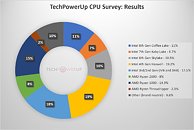
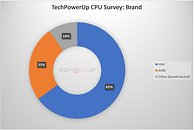
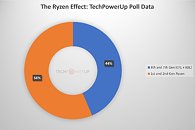
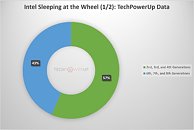
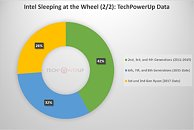

96 Comments on TechPowerUp Processor Survey Results: The Ryzen Effect is Real
OEMs only look for safety/usability. All the old AMD models did not support some of the key instruction sets and also they were power hungry and slow. After Ryzen, AMD is moving strong. Even Lenovo rep was saying most of the companies are not showing interest in AMD and they are asking for loner laptops and Mini/tiny
Enterprise space is rather cliched & more like an old boy's club tbf changing their ways takes a lot more time than it should.
I hope corporates spend a bit more time in analyzing actual data and get a test system which is supported by OEM than looking at benchmark and deciding which is totally waste of time as their main application/environment is all that matters on any platform.
Love it or hate it, PC Mark is relevant when choosing a generic PC for the office.
Servers are a different story and I'll admit, Idk how Epyc compares to Xeon.
I dunno, I say choose a better browser or even GPU, workstation CPU's are different though where MT scores can be really important.
EPYC compares rather favorably, but enterprise is like a first & you'll all sorts of customers with very different needs.
Even so, by this time next year, Zen2 will probably be some really, really bad news for Intel.
Like I said above, Zen+ runs at higher clocks so it has closed some of that gap and Zen2 is presumably bring a 15% IPC improvement to the table. Interesting time ahead.
venturebeat.com/2018/04/19/amd-wants-to-steal-more-market-share-with-2nd-generation-ryzen-desktop-processors/
There you go. HP and Lenovo individually have more market share than every 3rd party vendor combined and in a single quarter they sell 500-600x more complete pcs than mindfactory sells cpus. Only enthusiasts build computers, and enthusiasts are by FAR(several orders of magnitude) the minority of PC owners. No company larger than like 50 people would even consider building custom computers.
Steam Survey (Gaming) - Intel May = 83.63% / June = 83.74% / July 84.79% ... 1.05% jump in just a month
store.steampowered.com/hwsurvey/processormfg/
Overall Numbers - Intel Q2 = 79,30% / Q3 = 79.40%
www.statista.com/statistics/735904/worldwide-x86-intel-amd-market-share/
You can clearly see that before RyZen, the average core count # was just below 4 and now it's @ 6 for AMD and just a tad below that for Intel. Also, the price per core is much lower on the AMD side VS Intel.
With the advent of Intel's 10nm woes and tight supply of 14nm products, AMD is starting to really cash in @ least @ Mindfactory, where they are outselling Intel both in units AND total revenue:
Full article here and data compiled by this Reddit user.
?